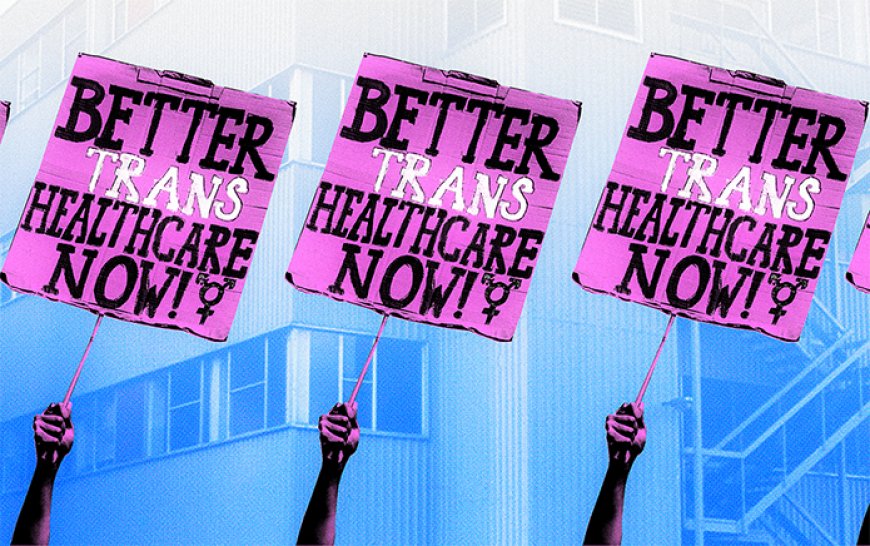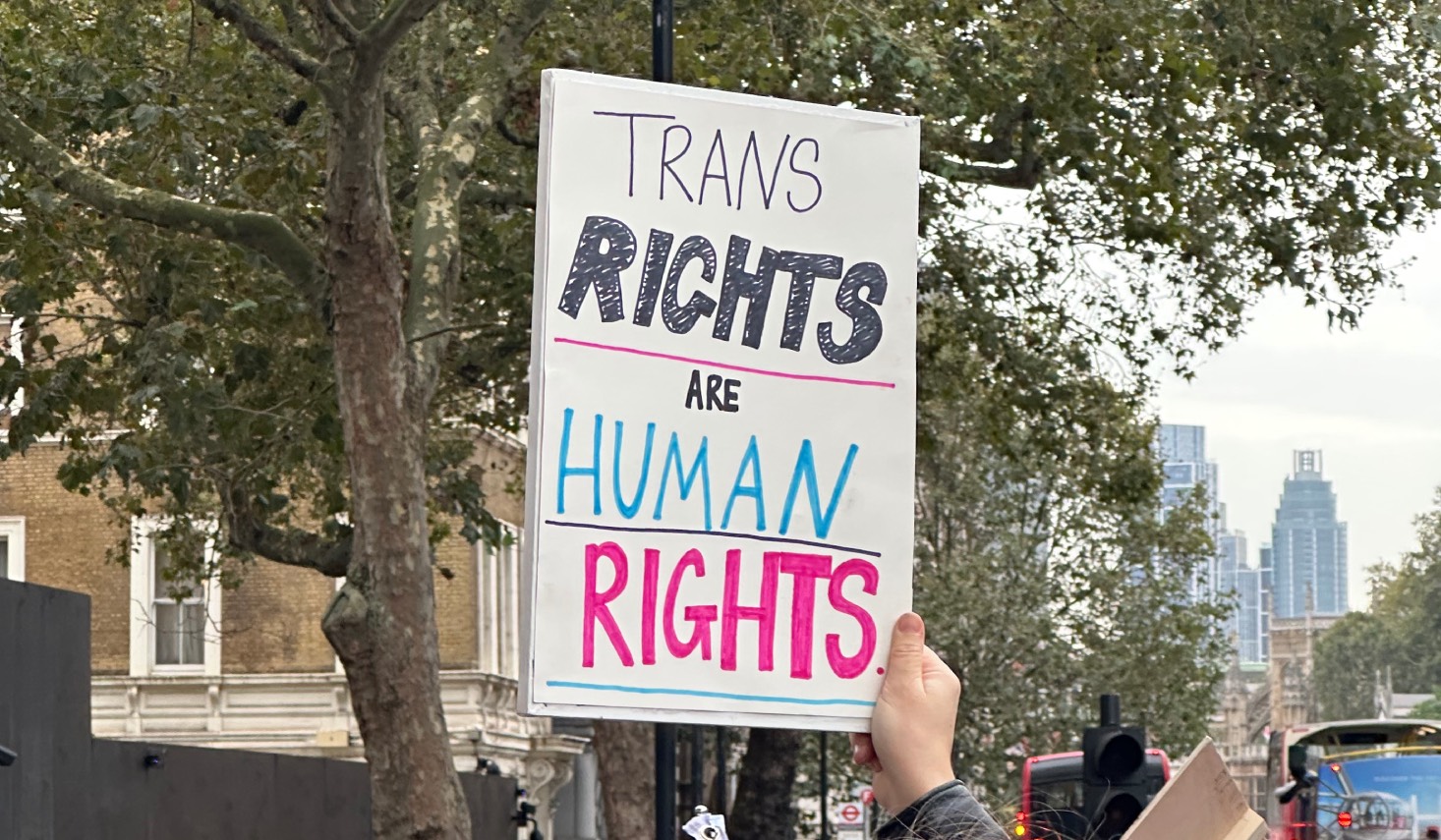Trans people are finding it harder to access life-saving treatment
Reports of treatment being refused or withdrawn are on the rise – and no official figures exist to track the issue. THIS ARTICLE FIRST APPEARED ON TBIJ (THE BUREAU OF… The post Trans people are finding it harder to access life-saving treatment appeared first on GAY TIMES.


Reports of treatment being refused or withdrawn are on the rise – and no official figures exist to track the issue.
THIS ARTICLE FIRST APPEARED ON TBIJ (THE BUREAU OF INVESTIGATIVE JOURNALISM)
REPORTER BILLIE GAY JACKSON
BUREAU LOCAL EDITOR GARETH DAVIES
DEPUTY EDITOR KATIE MARK
EDITOR FRANZ WILD
PRODUCTION EDITOR JOSEPHINE LETHBRIDGE
FACT CHECKER RACHEL SCHRAER

The text message Emily* received from her GP practice was life-changing. Emily, who is transgender, was first prescribed hormone replacement therapy (HRT) two years ago. It had enabled her life to feel “ordinary”. Suddenly her prescription had been stopped.
The message explained that the GP practice was unable to “safely support ongoing prescribing or monitoring” of the “specialist drug”. If Emily wanted a new prescription, she would have to go private – a cost she could not afford.
In recent months the Bureau of Investigative Journalism’s (TBIJ) Trans+ Voices team discovered that some trans+ people, like Emily, have had HRT refused or withdrawn. This had happened even when the prescription had been recommended by a specialist – and in some cases after having received the treatment for years.
Similar experiences shared on online forums suggested these were not isolated incidents. So TBIJ set about trying to determine the scale of the issue.
But no official data exists to clearly indicate the number of trans+ people who have had ongoing prescriptions withdrawn, neither across the NHS as a whole nor at most individual gender clinics. Prescription refusals, which occur when a person tries to start the treatment, are sometimes documented but not at a national level.
TBIJ sought to collect its own data and Emily was among more than 60 trans+ people who replied to our survey on the subject.
While the survey cannot be considered representative of the trans+ community as a whole, responses included others who say they have experienced withdrawals of care. Emily, who is 25, was not the only respondent who had been taking HRT for years when their prescription was stopped by a GP.
Staff at multiple NHS gender services also said that the issue of care withdrawal has become more frequent in the past year.
Gender-affirming healthcare
While HRT is best known for its use in treating symptoms of the menopause, it is also a form of gender-affirming healthcare for trans+ people, as it can help them feel more aligned with their gender. It’s a lifelong treatment. Studies have found it to be safe and that its many benefits to the health and wellbeing of transgender people usually outweigh the risks. As another person who replied to our survey put it, “this prescription is life-saving for me.”
The reasons given for why such treatment is withdrawn or refused vary. Some people have been told their GP doesn’t feel qualified to provide the care, whereas other GPs have declined the work on the grounds they don’t have the resources to provide it. Some GPs are refusing to prescribe HRT due to a contractual dispute.
Others, in their responses to a survey by Transactual, a trans-led research group, said their GPs had cited a lack of policy or personal beliefs as reasons why they had withdrawn or refused their HRT prescriptions.
The issue appears to reflect a wider rollback of access to gender-affirming healthcare in the wake of April’s publication of the controversial Cass Review into health services for trans young people. This review claimed that the evidence base of using puberty blockers and gender-affirming hormones for young people was “weak”. Some of the same medicines are used in adult care.
The review did not recommend a ban on puberty blockers but resulted in one for young people experiencing gender dysphoria (they are still permitted for children experiencing early puberty). The ban was extended by the new Labour government in August. Adult gender services are now also under review.
The World Professional Association for Transgender Health said the refusal or withdrawal of HRT for trans patients raised “ethical and clinical” concerns.
“Hormones should not be stopped for political reasons or in the absence of a recognised medical issue,” a spokesperson told TBIJ. “If GPs are withdrawing prescriptions despite recommendations, this could result in negative impacts on patients’ mental and physical wellbeing.”
‘I’m in limbo’
In 2021, Emily received a diagnosis of gender dysphoria – the distress or unease felt by a person when there is a mismatch between their gender identity and the sex they were assigned at birth.
To avoid a lengthy wait for an NHS gender clinic, she had opted for a private gender service. Analysis by the BBC’s Newsnight programme in March found that the backlog of people waiting for first appointments would take 10 years to clear.
“It’s important to say that even for trans people who do have access to healthcare they don’t necessarily get the care they want or would prefer, but you kind of just have to go along with it,” said Emily.

The HRT which would later be prescribed by her GP made life feel more livable. Her doctor had been prescribing and monitoring it – until this summer, when this suddenly changed without consultation.
No one spoke to her face-to-face about the decision. Instead she was informed by text message. “I’m in limbo,” she said. “My mental health has been in such a precarious position because of the struggle to get healthcare.”
Emily doesn’t believe all staff at her practice were on board with the decision. “I feel sympathy for the members of staff who are having to go along with [withdrawing prescriptions] … it’s obviously a systemic problem.”
Elijah, 33, also used a private service to avoid waiting for an NHS clinic. He waited six months for an appointment and paid a fee before receiving a gender dysphoria diagnosis.
The testosterone he was prescribed after this diagnosis had made him feel confident, grounded and happier. His GP had been so supportive that he hadn’t imagined losing access to it. But, after moving house and registering with a different practice, his new doctor decided to discontinue the prescription he had been receiving for two years.
“I found it so paralysing that she had made that decision for me,” said Elijah. “I had no say, despite having proof that everything had been fine for the last two years.
“You’re trying to do your life, trying to work … it’s totally destabilising.”
The inaccessibility of gender-affirming care has driven some people to resort to drugs bought online from unregulated sources or shared within their community.
“There’s a reason why so many people don’t go through the system,” said Elijah. “Some of that is to do with wait times and more of that is to do with bad experiences and having to have awful conversations with medical practitioners.”
Wider rollback
Kamilla Kamaruddin, who has been a GP for two decades, sits on the board of Spectra, a sexual health and wellbeing organisation, and is currently a lead clinician at the East of England Gender Service. In her experience, the issue of care being refused or withdrawn from trans+ people has become more frequent.
“GPs who refuse to prescribe are still in the minority but we’re seeing more and more GPs who are refusing to prescribe on the basis that they don’t have the expertise … even though they have already done the prescribing for a very long time,” she said.
“If a GP didn’t know how to treat a heart condition they’d ask a cardiologist – they’d get advice and guidance … for some GPs this doesn’t seem to apply to treating trans people.” The General Medical Council, the regulator of doctors in the UK, has previously stated to GPs that the provision of HRT prescriptions to transgender adults is not a highly specialist area and does not require specific expertise.
Staff at other NHS gender services also told TBIJ the issue of HRT withdrawal, though it has affected a minority of their patients, has become more frequent in the past year.

In response to TBIJ, NHS England said it had more than doubled investment in gender dysphoria services and increased the number of clinics from seven to 12 since July 2020. A review of gender services for adults “will look at how to overcome the challenges that some individuals face in accessing a timely prescription”, it added.
The Department of Health and Social Care said it was waiting for the outcome of that review, adding: “We know that adults questioning their gender identity have struggled to get the support they need.”
Though anecdotal evidence suggests an increase in HRT withdrawals, evidencing the scale of that increase is very difficult. The NHS does not always record each time a GP withdraws a person’s medication or refuses a recommendation.
The information kept by gender clinics is similarly inconsistent. In response to freedom of information requests submitted by TBIJ, some NHS gender clinics confirmed they do not routinely record when a GP decides not to prescribe HRT to trans+ patients. Others said they would make a note in a patient’s file but the information is not recorded systematically.
Manchester’s Indigo Gender Service, on the other hand, has been recording data on the prescriptions it recommends for patients. Between 2022-23, 8% of its HRT requests were refused by GPs. The following year this rose to 11%, meaning more than one in 10 of their service users were unable to access HRT via their GP, despite being recommended the treatment by an NHS specialist service.
Tavistock and Portman, the UK’s largest gender identity clinic, said refusals to prescribe HRT were a “frequent occurrence” but it was not able to provide the relevant data due to the format it was held in. The Gender Identity Service in Leeds said it had experienced an increased number of GP practices that were unable to begin or continue prescribing HRT. It also could not provide specific figures.
The picture is complicated by the fact that some trans+ people opt for private services. Different NHS practices will have their own policy on whether they collaborate with private healthcare providers. Gender Plus, a private provider, told TBIJ that 35% of the adults it had recommended HRT prescriptions for received these privately, not from their NHS GP.
Not enough funding
One reason cited – both to patients and to services – by GPs who have declined to provide care for their trans+ patients, is a lack of funding.
It was reported by the Health Service Journal in November that prescriptions, including for mental health conditions and eating disorders, were being cancelled by GP practices, potentially as a form of “collective action” in response to a lack of funding. The article cited a letter written by GPs in Dorset in which they said they would be declining “shared care” requests including those relating to gender dysphoria.
A spokesperson for the British Medical Association, told TBIJ that the “collective action” is about GPs “stopping work that is not properly paid for or resourced”, adding that it recommends alternative arrangements are put in place by NHS Commissioners so patients are not “adversely impacted by these actions”.
“Overstretched practices continue to do a considerable amount of work that is not commissioned by the NHS but should be,” they said.
“Many GPs are not trained to provide the specialist care these patients need and therefore fear risking patient safety. Because of this, some are refusing to take on new shared care agreements until there is a proper agreement that protects both patients and practice staff.”
Before 2022, the responsibility for starting and monitoring a HRT prescription rested solely with GPs. Then two years ago, some NHS gender clinics became able to prescribe directly to their patients for a limited period before transferring to GPs. But they aren’t designed to prescribe and monitor HRT for their patients on a long term basis.
Sussex is one region in England where extra money is available for GPs to provide gender-affirming care, including paid training and additional funding per patient. But, despite the extra cash, prescription refusals still occur.
The Cass Review
Multiple sources working within gender services and primary care told TBIJ that HRT prescription refusals or withdrawals have become more frequent in the last year. They believe the Cass Review, and the response of the Royal College of General Practitioners (RCGP), have contributed to the issue.
The RCGP updated its official position on transgender care in April in response to the Cass Review. It stated that GPs should “work with the gender services in the same way as with any other specialist” and called for the ongoing care of trans+ people to be adequately funded.
However, it also said that the RCGP would support GPs who felt their workload prevented them from providing such care for trans+ patients. The General Medical Council contacted the RCGP in May, warning that its statement risked introducing unfair discrimination.
Five months later the RCGP updated this statement again – removing the sentence that supported individuals from refusing care due to workload and clarifying that the statement was not meant to apply to patients who already had established HRT prescriptions.
A spokesperson for the RCGP told TBIJ: “The care of transgender and gender questioning people is a complex area of medicine and the RCGP has members with widely diverging views on the issue.”
It added that its position statement had been “rapidly” updated in response to the Cass Review. After reviewing feedback it had received following this update, it made some clarifications and “minor edits”.
“The College remains strongly committed to the improvement of services for patients with gender incongruence,” the spokesperson said.
Duncan, a GP for Sussex Gender Service, a NHS adult gender service pilot scheme said: “The Cass Review made recommendations for people up to the age of 25, even though it was a review of children’s [gender] services. I think those issues have confused the picture somewhat and I think GPs are genuinely scared that they’re being asked to do something that might potentially be breaking the law.”
Duncan told TBIJ: “[Some staff] don’t care about our community and they can get away with it because they’re emboldened by the rhetoric in society and politics. And I think part of it to be fair to them is that they are beleaguered, they are already overstretched.
*Names have been changed
The post Trans people are finding it harder to access life-saving treatment appeared first on GAY TIMES.

 Mark
Mark 





